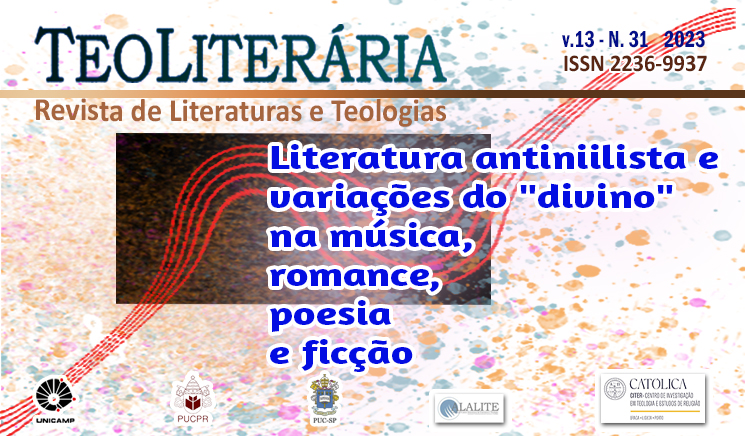The Ethos of Nihilism
DOI:
https://doi.org/10.23925/2236-9937.2023v31p36-53Keywords:
Nietzsche, desert, writing, literature, affirmationAbstract
In The Gay Science, Nietzsche describes the situation of man facing the death of God by using the image of “wandering in the infinite desert”. The article claims to discuss the philosophical issue of this “wandering”, in order to exhibit the specificity of Nietzsche’s experience of nihilism and to understand to what extent through this subject Nietzsche defines an unprecedented ethos in the history of thought which opposes him to Russian nihilistic tradition. At the same time, the article puts forward the hypothesis according to which this “wandering” announced by Nietzsche takes place very precisely in the mode of writing of the literature, which contaminates in Nietzsche the philosophical speech. We want to show that there is a very strong connection between the problem of Nietzschean nihilism and the requirement of a language which is no longer that of truth, but that of fiction or of a saying by “wandering” which remains confined to nothing to say. Faced with the problem of nihilism, philosophy must – and we will clarify this necessity through a short reference to Heidegger and Nancy – join literary writing or be done through it.
References
Adorno, Theodor. Dialectique négative. Trad. Collège de philosophie, Paris: Payot et Rivages, 2001.
Barthes, Roland. Le bruissement de la langue. Paris: Seuil, 1984.
Benoit, Éric. Comme si de rien n’était… (typologie des nihilismes). Modernités, n. 33, 2012: 17-44.
Bensussan, Gérard. Miroirs dans la nuit. Lumières de Hegel. Paris: Cerf, 2022.
Blanchot, Maurice. La littérature et le droit â la mort. In: Blanchot, Maurice. La part du feu. Paris: Gallimard, 1949: 290-331.
BONAMOUR, Jean. À propos de Pères et fils d’Ivan Turgenev : Bazarov ou la parole impossible. Revue des Études Slaves, n. 70-3, 1998: 649-656.
buzzi, Franco. Nichilismo. Milano: Editrice Biblkiografica, 2016.
D’AGOSTINI, Franca. Logica del nichilismo. Dialettica, differenza, ricorsività. Milano: Laterza, 2000.
Goethe, Johann Wolfgang von. Les souffrances du jeune Werther. Trad. P. Leroux. Paris: Librairie Générale Française, 1999.
Gorgias. Du non-être ou de la nature. In: Les présocratiques, trad. J.-P. Dumont. Paris: Gallimard, 1988: 1022-1028.
Heidegger, Martin. Qu’appelle-t-on penser ?. Paris : PUF, 1959.
Heidegger, Martin. Über de Linie. In: Gesamtausgabe. I Abteilung: Veröffentlichte Schriften 1914-1970. Vol. 9. Frankfurt Am Main: Vittorio Klostermann, 1976: 385-426.
Herzen, Alexandre. Encore une fois Bazarov. Paris: L’Étoile polaire, 1869.
Hölderlin, Friedrich. Samtliche Werke. T. 4.1. Stuttgart: Grosse Stuttgarter Ausgabe, 1961.
Kofman, Sarah. Explosion. T. 1. Paris: Galilée, 1992.
JEAN-PAUL (RICHTER, Friedrich), Cours préparatoire d’esthétique. Trad. A.M- Lang; J.-L. Nancy, Lausanne: L’Age d’Homme, 1979.
Lacoue-Labarthe, Philippe. La fable (littérature et philosophie). In Lacoue-Labarthe, Philippe. Le sujet de la philosophie. Typographies 1. Paris: Aubier-Flammarion, 1979: 7-30.
Lacoue-Labarthe, Philippe. L’imitation des modernes. Typographies 2. Paris: Galilée, 1986.
Leibniz, Gottfied Wilhelm von. Principes de la nature et de la grâce. Trad. C. Frémont, Paris: Flammarion, 1996.
Michaud, Ginette. Cosa volante. Paris: Hermann, 2013.
Nancy, Jean-Luc. La déclosion. Déconstruction du christianisme I. Paris: Galilée, 2005.
Nancy, Jean-Luc. La vérité de la démocratie. Paris: Galilée, 2008.
Nancy, Jean-Luc. Hors colloque. In: BERKMAN, Gisèle; COHEN-LEVINAS, Danielle (ed.), Figures du dehors. Paris: Cécile Defaut, 2012: 517-538.
Nietzsche, Friedrich. Ainsi parlait Zarathoustra. Trad. G. Bianquis. In: Œuvres. Paris: Flammarion, 2000: 323-617.
Nietzsche, Friedrich. Briefwechsel. Kritische Gesamtausgabe, Zweite Abteilung. 6/2. Berlin: de Gruyter, 1980.
Nietzsche, Friedrich. Ecce homo. Trad. É. Blondel. In: Œuvres. Paris : Flammarion, 2000: 1201-1297.
Nietzsche, Friedrich, Fragments posthumes. Œuvres complètes. T. XIII, trad. P. Klossowski; H.-A. Baatsch, Paris: Gallimard, 1976.
Nietzsche, Friedrich, Gai savoir. Trad. P. Wotling. In: Œuvres. Paris : Flammarion, 2000: 31-321.
Nietzsche, Friedrich. La volonté de puissance. T. 2. Trad. G. Bianquis. Paris: Gallimard, 1995.
Podoroga, Ioulia. L’idée de nihilisme en Russie. Un essai de Begriffsgeschichte entre littérature et philosophie. In: Noesis, n. 33, 2019: 63-75.
Severino, Emanuele. Essenza del nichilismo. Milano: Adelphi, 1995.
Volpi, Franco. Introduzione al nichilismo. Milano: Laterza, 2009.
Published
How to Cite
Issue
Section
License
Copyright (c) 2023 TEOLITERARIA - Revista de Literaturas e Teologias

This work is licensed under a Creative Commons Attribution 4.0 International License.
TeoLiteraria – Journal of Literatures and Theologies owns the copyright of all published material. The whole reproduction of the articles of this Journal in other publications or for any other purpose, by any means, requires a written permission of the editor of this journal. Partial reproductions of articles (abstracts, more than 500 words text, tables, figures and other illustrations) must have a permission written by the publisher and the authors.

